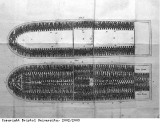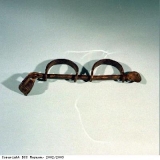Personal account of an enslaved African
This is an extract from a book called The Interesting Narrative of the Life of Olaudah Equiano, or Gustavus Vassa, the African. Written by Himself. It was published in 1789. Olaudah Equiano was born in what is now southeastern Nigeria and was enslaved at the age of about 10. Equiano bought his freedom from his master in 1766. Equiano wrote his life story as part of the campaign to end slavery. It begins with his childhood memories of life in Africa, and goes on to tell of his abduction and sale into slavery, and his life as a slave and eventually as a free man. Equiano writes about the horrors of crossing the Atlantic Ocean (the ‘Middle Passage’, as this part of the voyage was called). He refers to the ‘galling of the chains’, that is, the chafing or soreness made by the iron shackles and chains rubbing skin raw. Pictured here is a plan of the slaves in the hold of the Liverpool slave ship called the Brookes. The shackles on the legs of the men are can be seen in the picture. Women and children did not usually have to wear them. Olaudah Equiano wrote:
‘The first object which saluted my eyes when I arrived on the coast was the sea, and a slave ship, which was then riding at anchor, and waiting for its cargo. These filled me with astonishment, which was soon converted into terror when I was carried on board. I was now persuaded that I had gotten into a world of bad spirits, and that they were going to kill me.
I was soon put down under the decks, and there I received such a salutation in my nostrils as I had never experienced in my life; so that, with the loathsomeness of the stench, and crying together, I became so sick and low that I was not able to eat, nor had I the least desire to taste anything. I now wished for the last friend, death, to relieve me; but soon, to my grief, two of the white men offered me eatables; and, on my refusing to eat, one of them held me fast by the hands, and laid me across I think the windlass, and tied my feet, while the other flogged me severely. I had never experienced any thing of this kind before; and although, not being used to the water, I naturally feared that element the first time I saw it, yet nevertheless, could I have got over the nettings, I would have jumped over the side, but I could not; and besides, the crew used to watch us very closely who were not chained down to the decks, lest we should leap into the water; and I have seen some of these poor African prisoners most severely cut for attempting to do so, and hourly whipped for not eating. This indeed was often the case with myself.
In a little time after, amongst the poor chained men, I found some of my own nation, which in a small degree gave ease to my mind. I inquired of these what was to be done with us; they gave me to understand we were to be carried to these white people’s country to work for them. I then was a little revived, and thought, if it were no worse than working, my situation was not so desperate; but I still feared I should be put to death, the white people looked and acted, as I thought, in so savage a manner; for I had never seen among any people such instances of brutal cruelty; and this not only shown towards us blacks, but also to some of the whites themselves. One white man in particular I saw, when we were permitted to be on deck, flogged so unmercifully that he died in consequence of it and they tossed him over the side as they would have done a brute.
At last, when the ship had got in all her cargo, they made ready, and we were all put under the deck. The stench of the hold while we were on the coast was so intolerably loathsome, that it was dangerous to remain there for any time, and some of us had been permitted to stay on the deck for fresh air; but now that the whole ship’s cargo were confined together, it became absolutely pestilential. The closeness of the place, and the heat of the climate, added to the number in the ship, which was so crowded that each had scarcely room to turn himself, almost suffocated us. This produced copious perspirations, so that the air soon became unfit for respiration, from a variety of loathsome smells, and brought on a sickness among the slaves, of which many died, thus falling victims to the improvident avarice of their purchasers. This wretched situation was again aggravated by galling of the chains, now become insupportable; and the filth of the necessary tubs, into which the children often fell, and were almost suffocated. The shrieks of the women and the groans of the dying, rendered the whole a scene of horror almost inconceivable. Happily perhaps for myself I was soon reduced so low here that it was thought necessary to keep me almost always on deck; and from my extreme youth I was not put in fetters.
In this situation I expected every hour to share the fate of my companions, some of whom were almost daily brought upon deck at the point of death, which I began to hope would soon put an end to my miseries. One day, two of my wearied countrymen who were chained together, preferring death to such a life of misery, somehow made through the nettings and jumped into the sea: immediately another quite dejected fellow, who, on account of his illness, was suffered to be out of irons, also followed their example; and I believe many more would have done the same if they had not been prevented by the ship’s crew, who were instantly alarmed. Those of us that were the most active were in a moment put down under the deck, and there was such noise and confusion amongst the people of the ship as I never heard before, to stop her, and get the boat out to go after the slaves. However two of the wretches were drowned, but they got the other, and afterwards flogged him unmercifully for thus attempting to prefer death to slavery. In this manner we continued to undergo more hardships than I can now relate, hardships which are inseparable from this accursed trade.’




